
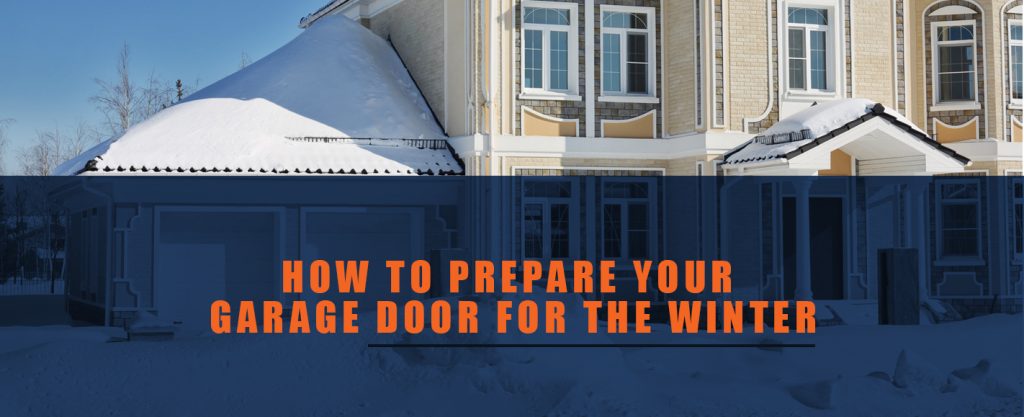
The air is finally cooling down, leaves are collecting on the sidewalk, college football is on TV and chili is in the crockpot. Yes, fall is here, and after a hot, humid summer, it’s time to enjoy this beautiful season.
Along with all the fun things about fall, it’s also an important time of year for homeowners. Not only is it a time to finish up projects that were started over the summer, but it’s also the time to look ahead to prepare your home for winter. Maybe you cover your flower beds and vulnerable shrubs. Maybe you clean out gutters and trim trees. Maybe you have your fireplace serviced and wood stacked near the back door. The list is long and, depending on where you live, it can be rather involved.
There is one winter preparation project that many homeowners overlook, even though it can be costly to do so.
Call 336-830-8468 To Speak To An Expert
You likely use your garage door several times a day, but you probably haven’t given much thought to the impact that cold weather can have on this vital entry and exit point on your home. The truth is that your garage door — like other exterior features of your home — is subject to a lot of wear and tear because it’s exposed to the elements. Not only that, but most people raise and lower their garage doors several times a day, so it’s getting a lot of daily use.
While you don’t have to wait for cooler weather to start paying attention to your garage door, the pending arrival of winter is a good time for garage door maintenance.
Jump to Section:
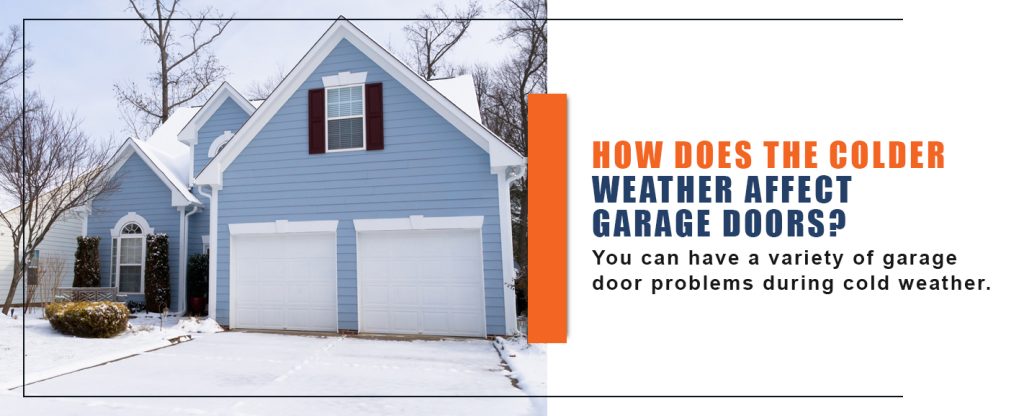
You can have a variety of garage door problems during cold weather. Cold temperatures can cause the metal parts of your garage door to shrink, especially springs and screws. When they shrink, this can cause problems with your door’s ability to open and close, as well as impact its overall quality and durability. Tracks are more likely to warp and springs more likely to break in cold weather. With either of these problems, you should call a professional garage door repair company to fix it.
Making sure the metal parts of your door are in good working order will go a long way in keeping your door functioning when the cold weather hits. If your door hasn’t been winterized, you might find yourself unable to open or close it during a snowstorm or deep freeze. And no one wants to leave their garage door hanging open when it’s below freezing outside.
Garage doors also serve as the first line of defense for your home to block the cold air from getting into your living space. When your door isn’t sealed or insulated properly, it can allow cold air to get into other areas of your house, wreaking havoc with your energy bills and leaving you chilled over the winter months. While some people find that an insulated door can be one way to minimize this issue, an insulated door isn’t for everyone — as we’ll discuss later.
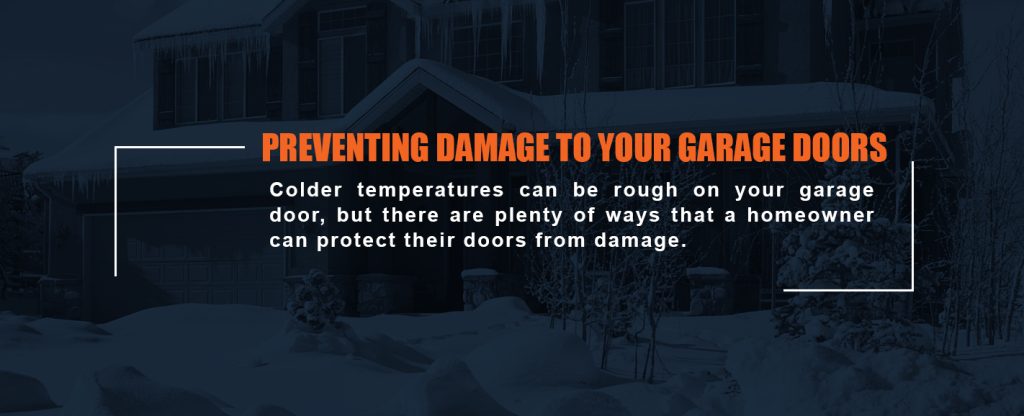
Colder temperatures can be rough on your garage door, but there are plenty of ways that a homeowner can protect their doors from damage. Some of these are not unique to the winter season, but if you haven’t done them recently, the upcoming change of seasons can provide a good reminder to you. Yes, this seems like something that would be easy to put off. But, trust us — you don’t want to wait to call a garage door repair professional to fix your door when the snow is falling and the wind is blowing.
Call (336) 830- 8468 To Speak To An Expert
Taking a proactive approach to maintaining your door and anticipating potential problems can save you a lot of hassle down the road, but, if December rolls around and you haven’t made time for your garage door, don’t tell yourself it’s too late and write it off. As long as it’s warm enough to safely work outside, it’s never too late to take care of your garage door.
1. Inspect the Door and Its Tracks
Start by simply standing outside and watching your door go up and down a few times. Listen for any sounds it makes. Watch its movement and note any places where the door seems to get caught. Watching for any unusual movement or listening for unusual sounds is important because it can be the first sign that something isn’t working as it should. Make note of the location where you see or hear anything unusual so you can investigate further.
It’s relatively simple for any homeowner to observe and inspect their garage door, however, this can also be a good time to call a professional to inspect your door. If your door is older or you suspect a problem, a professional can advise you on the best way to repair and take care of your door to keep it working as it should.
2. Lubricate the Door’s Moving Parts
This one is simple and can be done by just about any homeowner. Apply a spray lubricant to any of the garage door’s moving parts, including its springs, bearings and hinges. Alternatively, you can use a few drops of standard engine oil. Either way, a careful and thorough application can protect all of your door’s moving parts and keep it going up and down with ease. Never use grease — it’s too thick and will only make the tracks sticky and collect dust and hair.
3. Make Sure the Door Seals Correctly
The easiest way to detect problems with your garage door’s seal is to stand in your driveway after dark and look directly at the closed door. If you can see cracks of light coming through anywhere, then you likely have a problem with the seal around the door. There’s enough space for heat to escape and for cold air to get into your house anywhere you see light, so you should replace any damaged or missing sections of the seal.
The seal around the door can also build up dirt and grime, which can prevent it from sealing correctly. Spending a few minutes cleaning the seal around your garage door can save you a headache later. Using a standard household all-purpose cleaner, wipe down the weather stripping and make sure it’s free from anything that could cause a problem once it gets cold.
4. Organize Your Garage
Let’s be honest. After a summer of pool visits, barbecues and bike rides, your garage is probably not looking its best. Items like snow shovels, de-icer and even snow blowers are most likely hidden behind garden tools and sports equipment. As you’re inspecting your garage door, take this time to also give your garage a once-over. Straighten up and bring all of your winter must-haves out of the shadows, and put them in places where they will be easily accessible when you need them. This is especially important if you live someplace where snow piles up because there may be times when you can’t get your garage door open to dig for these items.
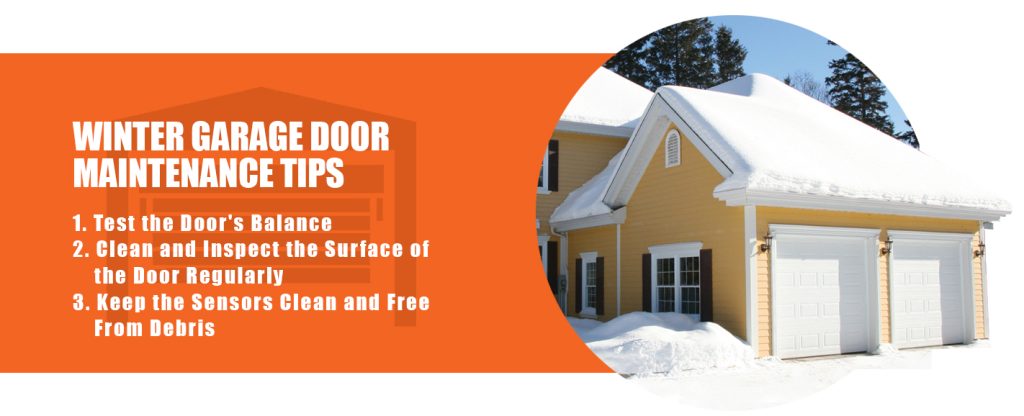
When it comes to maintenance, winter isn’t the only time you should pay attention to your garage door. It is, however, an optimal time to make sure your garage door is operating at its best. Besides maintaining the weather stripping and lubricating it each year, there are a few things you can do to ensure your garage door is fully operational during the winter months.
1. Test the Door’s Balance
A garage door that isn’t balanced can put undue strain on your garage door opener, which means it may not function like it should or last nearly as long as you want it to.
To check your door’s balance, disconnect it from your opener and manually run it up and down a few times to make sure there’s nothing obstructing the track. Then, push it halfway up and watch what happens. If it only moves back and forth a little bit, then it’s most likely balanced. If it falls down quickly or rolls up, that may be a sign that it isn’t balanced. Unbalanced doors commonly fall due to a loss of tension in the springs.
While you can try to rebalance your garage door yourself, we strongly recommend that you call a professional garage door repair company to address the issue. Adjusting torsion springs can be very dangerous so it’s best to have a skilled technician make any changes. Also, an unbalanced door could be a sign of a more serious underlying problem.
2. Clean and Inspect the Surface of the Door Regularly
When dirt builds up on the surface of your garage door, it can damage the door. Damage to the door will lead to problems with its ability to open and close as you need it to. Not only that but allowing dirt and grime to build up may decrease the lifespan of your door.
As you’re cleaning out your garage and inspecting the door, grab a brush and some soap, and start scrubbing. While you clean, also make note of any chips or cracks that may be appearing, particularly in wooden garage doors. If you have a steel or wooden garage door, it may be time to sand and repaint as well. Fall can be a great time to do this because a fresh coat of paint or stain will be even more effective in protecting your door against winter’s strongest weather.
3. Keep the Sensors Clean and Free From Debris
Today’s garage doors are designed with safety features to keep them from closing on objects underneath them. This is a great way to prevent injuries to small children or damage to a car. However, these safety features don’t operate effectively if the sensors are dirty or blocked. Even things like piles of leaves can potentially prevent your sensors from functioning properly. Be vigilant about keeping dust and dirt away from the lenses of the photocell sensors, as well as keeping leaves, snow and other debris away from the base of your door.
We strongly recommend investing in a new garage door if your garage door is older and does not have these safety features. It might seem like a big expense, but it’s vital to protect yourself and your loved ones from the dangers a heavy garage door can pose if a child or car gets stuck underneath it.
Check Out Our Other Garage Door Maintenance Tips
When a garage is attached to a home, it shares at least one common wall, which means that it can have a big impact on a home’s heating and cooling. So, does it help to purchase an insulated garage door or add insulation to an existing door?
The truth is that it depends on where you live and how you use your garage door. If your garage serves as your primary entrance and exit for your home — meaning it is opening and closing several times a day — it may be more beneficial to invest in better insulation for the shared wall that separates your garage from the rest of your home. Since it’s inevitable that cold air will come into the garage any time the door opens, creating a better barrier between your garage and the rest of your home can have a bigger impact than insulating the door itself.
However, if your garage is detached from your house or the door is rarely used, there may be some benefit to upgrading to an insulated door. The best rule of thumb when it comes to insulation and garage doors is to work closely with a professional garage door installation and repair company to determine which type of door will be best for you.
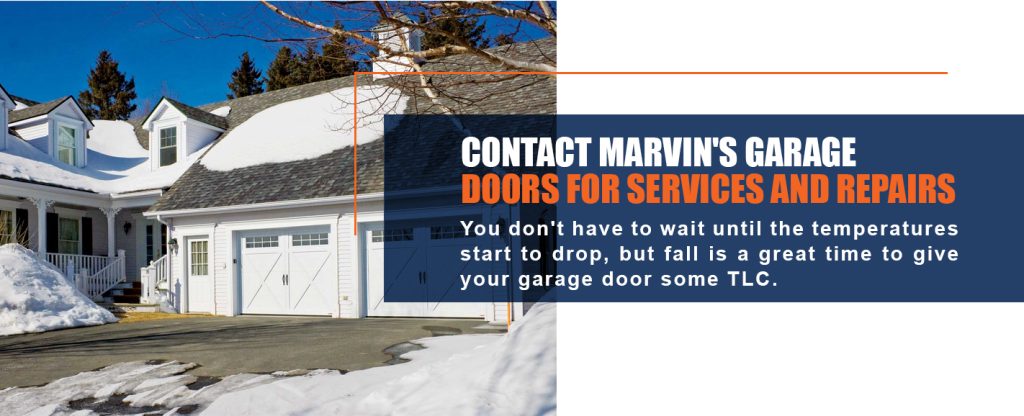
You don’t have to wait until the temperatures start to drop, but fall is a great time to give your garage door some TLC. By devoting a few hours to some basic maintenance and repair, you can keep your door functioning at optimal quality throughout the entire winter — no matter how brutal the weather gets.
Sometimes maintaining your garage door is going to require more than a little bit of oil or a quick adjustment. When you need an experienced garage door service and repair company, give Marvin’s Garage Doors a call. Family-owned and operated and serving Northwestern North Carolina since 1970, Marvin’s strives to provide high-quality, knowledgeable service with every call — no matter how big or small the issue.
As a Clopay Master Authorized Dealer, Marvin’s is also proud to offer a wide selection of high-quality garage doors for our customers who find that maintaining their older garage doors is no longer a viable option. Before the winter weather gets the better of your garage door, let Marvin’s get involved. Give us a call to request an estimate or request service.